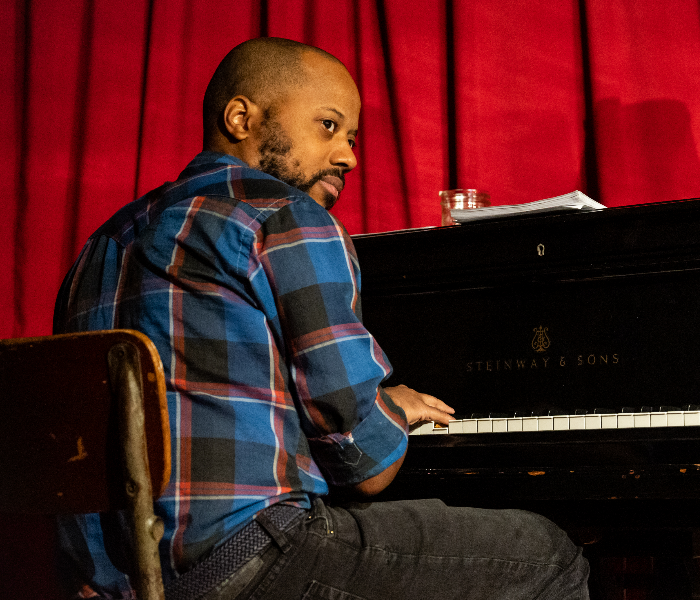Translate Page

With the industry in crisis, Theater in Asylum's new devised piece looks to the past to figure out the way forward
---
Katie Palmer and Paul Bedard, the co-artistic directors of the NYC-based Theater in Asylum, first learned about the Federal Theatre Project (FTP) in 2020 during the COVID-19 shutdown. "I was horrified that I had never heard of it," admits Bedard about the Works Progress Administration program, which ran from 1935 to 1939 as part of President Franklin D. Roosevelt's New Deal to help the US recover from the Great Depression. Under Hallie Flanagan's dedicated leadership, the FTP put artists to work by creating a federation of regional theatres that supported experimentation and introduced millions of Americans to the power of the live performing arts.
With American theatre once again in crisis due to fallout from the 18-month closure, dwindling subscribers and donations, and changing habits and cultural priorities, industry leaders are begging for federal intervention, with many invoking the legacy of the FTP. It's the perfect moment for Theater in Asylum's new play The Nobodies Who Were Everybody, a meticulously researched devised theatre piece exploring the FTP's rise and fall, which runs at Brooklyn's Jalopy Theatre August 3 to 20.
The title is a quote from FTP director Flanagan saluting the program's unsung heroes. "The ten thousand anonymous men and women—the et ceteras and the and-so-forths who did the work, the nobodies who were everybody, the somebodies who believed it—their dreams and deeds were not the end. They were the beginning of a people's theatre in a country whose greatest plays are still to come."
Initially, Theater in Asylum planned to create a show about Flanagan, an underappreciated visionary who built the FTP from the ground up and defended it against constant partisan attacks. Palmer, Bedard and their collaborators read Susan Quinn's Furious Improvisation: How the WPA and a Cast of Thousands Made High Art out of Desperate Times and, for their Cold Readings series, they performed some of the Living Newspapers created by FTP artists, including Flanagan's own E=mc²: A Living Newspaper About the Atomic Age.
But after delving into Flanagan's life and times, they realized she wasn't dramatic enough for a compelling play. "I love her to death, but she just didn't have the really juicy flaws that make good theatre," Bedard explains. "She was a really talented, really competent, really fierce person. The problem was everybody else."
Their focus shifted after hosting The FTP Cabaret, an evening of theatre, dance, music and poetry inspired by the program. Palmer and Bedard crafted a scene about a group of unemployed actors learning of the FTP's creation. That evolved into The Nobodies Who Were Everybody, a historical fiction about six artists involved with the FTP. The cast members contributed to the play, writing scenes, revising each other's work and bringing their own experiences to their roles.

Addy Paul Jenkins devised the part of Theo, a radical artist who protests the racism and suppression faced by Black artists in the FTP. "Learning about the censorship and the messiness that was imposed upon the Negro Theatre Unit did get me angry," says Jenkins about the FTP's collective for Black artists. "And I let that rage channel into the character."
Theo clashes with a fellow Black performer named Clara (Marcella Adams), who advocates for gradual change by working within the FTP instead of protesting from the outside. "Those are two different ways historically that we've always talked about trying to overcome these issues," says Jenkins. "One might not be more correct than the other. The show lets us chew on that."
Many FTP highlights are touched on in the play, including "Voodoo" Macbeth, Orson Welles' lauded 1936 adaptation of Shakespeare's tragedy reset on a Caribbean island and featuring an all-Black cast, and Marc Blitzstein's pro-union musical The Cradle Will Rock, which was infamously shut down by the government a few days before its Broadway premiere and subsequently moved to a private theatre.
The Nobodies Who Were Everybody also theatricalizes one of the FTP's most audacious accomplishments: the multi-city mounting of It Can't Happen Here, based on Sinclair Lewis' anti-fascist novel of the same name about a populist demagogue who becomes president. Flanagan arranged for 21 theatres in 17 states to premiere the play on the same night. There were productions in English, Spanish and Yiddish; Seattle's Negro Theatre Unit emphasized the dangers of dictatorship for Black citizens, while the Birmingham, Alabama staging set the action at a political convention.
"There's a scene in which you see two different productions in two different languages side by side," Bedard says. "We hope the audience gets the feeling of what it was like for this big national thing to happen."
The FTP's fate was sealed in December 1938, when Flanagan was accused of supporting a communist agenda through the program and forced to testify before the House Un-American Activities Committee. Congress pulled FTP's funding six months later.
Bedard and his cohorts acknowledge that the FTP's politically charged demise means a similar program probably couldn't get off the ground today considering our current culture wars. "Some of the themes that we play with in the show are these parallels between the 1930s and now, and how things have stayed so stagnant," Jenkins notes.
Bedard isn't sure a bailout for nonprofit theatre as it currently operates makes sense, and his co-director Palmer points out that catastrophe can spark innovation. "Is this a moment of burning the forest right now in order for something else to grow and come through?" she wonders. "It's not that I want things to burn; it's not that I want things to fail. But there is always opportunity in a moment of crisis."
The Nobodies Who Were Everybody invites audiences to imagine a better future for American theatre by looking at what the FTP got right. "We consider ourselves hardworking nobodies, and we look to the hardworking nobodies of that era," says Bedard. "So much of what we've done would have never been possible without this long lineage."
---
TDF MEMBERS: At press time, discount tickets were available for The Nobodies Who Were Everybody. If you're not a member, Theater in Asylum is also offering sliding scale tickets.
Top image: Rashad Brown in a rehearsal for The Nobodies Who Were Everybody, which is running at the Jalopy Theatre in Brooklyn. Photo by Shubhra Mishra.